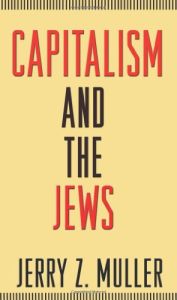Join getAbstract to access the summary!

Join getAbstract to access the summary!
Jerry Z. Muller
Capitalism and the Jews
Princeton UP, 2010
What's inside?
Four erudite essays explain how interactions between capitalism and the Jews shaped modern life.
Recommendation
Good etiquette advises that discussing religion, money and politics with strangers is not prudent, but, fortunately, professor Jerry Z. Muller ignores this maxim. Instead, this broadly published academician presents four exceptional essays assessing the role of Jews in developing capitalism in terms of complex social, historical and religious structures. He wrote the series, which covers centuries of history, over the course of 30 years of study. His combined notes and bibliography alone are 29 pages. Muller tellingly shows the relationships among the political, theological and economic ideas that created some of the best and worst events in modern society. getAbstract highly recommends this enlightening, accessible work of contemporary scholarship.
Summary
About the Author
Jerry Z. Muller is professor of history at the Catholic University of America in Washington, D.C. His previous books include The Mind and the Market: Capitalism in Modern European Thought and Adam Smith in His Time and Ours.



















Comment on this summary